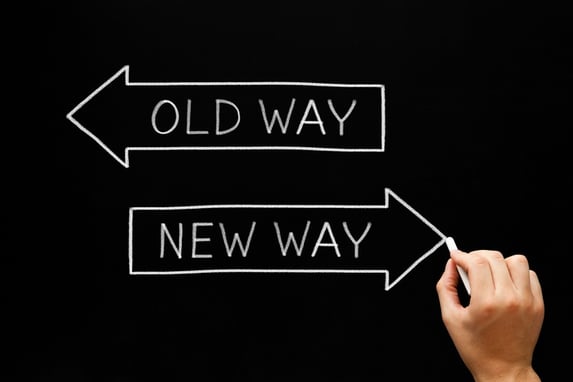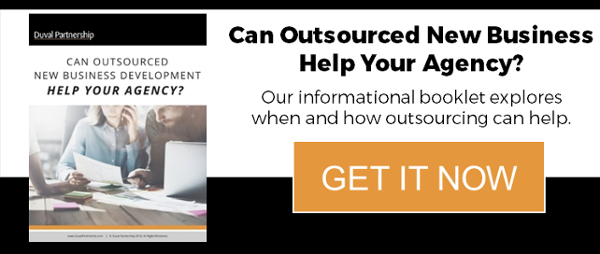
At the beginning of every engagement with a new agency, our team at The Duval Partnership will assess the agency’s positioning and new business processes. We need to know their strengths and weaknesses so that we can be effective when we go out to help them secure new business. We’ll look at an agency’s website and other assets and ask multiple questions, some of which include:
- How do they present themselves to the world?
- Do I quickly understand what the agency does?
- Is it easy to see which verticals they have expertise in?
- What’s missing?
- What’s inconsistent?
- What might be done short term and long term to improve their position?
In other words, we are constantly evaluating agency positioning. Some do it better than others, and that’s always exciting because it helps us do our job better and faster. But I’ve yet to come across an agency that doesn’t have some room for improvement. And far too often, we discover that their approach to new business or their website is doing the agency a disservice in some way or another.
So we came up with a list of common things that will prevent your agency from thriving in the future. Many will be familiar, but I can all but guarantee your agency is not knocking it out of the park on all of these fronts. Some of them are lower hanging fruit, and addressing them today will help support your agency’s new business capabilities for next year and the year after. So here goes...
5 Things That Will Prevent Your Agency from Thriving
Number One: Interchangeability
This is one area where it's really important to get opinions from people who are outside of your agency because it’s difficult to have a good perspective when evaluating your own agency.
Once people are on your website, they should never think they are on any other agency’s site. They should never think that your agency could be any other agency. What makes your agency stand out should be clear — and they shouldn’t have to work to find out what it is (because they won’t).
Your agency’s value has to be clear from a prospective client’s point of view. It’s about what has meaning for your visitors. Pay close attention to your choice of words and what you are telling people about your agency. Honestly, if I see one more agency that describes themselves as a “full-service agency…” well, let’s not go there. The ways to differentiate your agency are many, so long as you start from the assumption that it is possible to do so in a meaningful way.

Remember, refusing to differentiate sends a message too, which is basically: “We are stubborn and resist evolving, we don’t care what everyone else says, this is how we’ve always done it, and we’re sticking to it.” Is that an impression you’re comfortable giving?
What is your agency’s story? Ask people who are removed from your agency whether the “who, why, and what” of your agency comes across clearly. Give people a reason to connect and care, without making them search for it. Make them want to work with you.
Number Two: Poor Website User Experience
In the broadest sense, user experience starts with SEO, website structure, and site performance. There are what seems like a million agencies out there, so don’t forget that making your agency stand out starts with search. Think about your keywords and meta descriptions and other performance factors that impact people’s ability to discover your agency and get to your site in the first place. You might think that SEO wouldn’t be a big problem for agencies, but the search results we got indicate otherwise.
One thing we often see is websites that are too creative. While eye candy is great in its proper place, agencies need to think about user experience too. Both in terms of logical navigation for people to easily find what they are looking for, and by providing the information that will answer their likely questions. If you want to go avant-garde, then present it so that people can understand what it represents in context.
Another problem with the “art first” approach, or just poor website design in general, is that often the business case for using your agency is not clear. The result is not the creative. The creative is a tool for business results. Speak the language of your target. Your visitors may be company executives and not necessarily marketing executives. Yes, display your creative, but serve it up in the context of bottom-line results and performance metrics. Write and design for your visitors and prospective clients, not your peers. That means your case studies too!
Common problems with agency case studies:
- There are none
- There are no metrics provided, just a vague story
- The metrics provided are inconsequential from a business perspective (social “likes”?)
- They are dated and make it look like you haven’t done anything recently
- They are not flagged or sorted by industry and problem type so that people can see how you solve problems like theirs
- The outcome is not compelling
- The metrics provided raise more questions than anything else; the results are unclear
- You don’t have case studies related to your current target industries
- Examples of creative used to support the case study are not provided where they could be (where possible, connect the dots for visitors)
Your case studies are a great way to present information your prospective clients want to know; show them how you can help them and what your agency is capable of. If you put the case study details on your web page (versus in a download), it may also offer some added SEO benefits.
How do your case studies stack up? Get expert feedback and suggestions with an Agency Audit:
Number Three: Clinging to the Past vs. Finding Solutions for Future Growth
If you work for an agency that steadfastly refuses to find a niche and differentiate itself, obviously, this probably applies to you. But even the most adept and nimble agencies are likely to have room for improvement in this area, simply due to the speed at which the advertising industry is changing. Hear me out.
Last week I wrote about what’s going on with CPG brands and how it is trickling down to hurt the biggest agencies. Other major change is afoot with digital and increased competition from consultancies such as IBM and Deloitte, just to name a few major advertising industry trends. The bottom line is that the way brands engage agencies is changing. The question is: What is your agency doing in response?
Is your agency’s area of expertise in a dying or struggling industry sector? Crossing your fingers and hoping for the best is not a strategy. Make a plan. Thank yourself later.

If you think everything is going to circle back around to the old normal, think again. The agencies that are thinking about how they can adapt and profit from the changing landscape are the ones who are going to come out ahead. Whether that is taking on more project work that you would not have considered in the past, or finding a way to offer consulting services that are different, or in addition to, what a brand’s agency of record may be able to offer. Find ways to work outside of and around the old AOR paradigm. Of course, those ways need to make sense for your agency; we’re the first to say not all business is good business, but don’t lock your agency out of paths to growth for no reason. Presenting new solutions and new ways for people to engage with you can be a great look for your agency.
Under this umbrella, I also include thinking about ways to get your agency off the hamster wheel of costly RFIs/pitches and out of the commodity pay structure. Is your agency competing on price? If so, why not just order an agency tombstone now? Forbes Agency Council wrote a two-part series recently about rethinking the advertising industry’s business model. In addition to finding a true niche, they talk about decoupling creative strategy from marketing logistics as a path to regain “the magic” and break free of commoditization. Read the article. Follow their suggestion or do something else, but make your own path.
Number Four: Taking All New Business Indiscriminately
Please, be discriminate! Say no. Value your time and resources. Because every minute you spend with a client who is underpaying you and inflating your scope creep to new heights, and they aren’t a client whose name you can use to help build your business, that is a client that is keeping you from something more fruitful. I don’t even necessarily mean another client. It could be time and resources invested into your own agency, making plans to position yourself for future new business growth. Because if you aren’t ready for the clients you want to have when they come your way, you will have a hard time attracting them.
Speaking of which, have you defined your ideal client? Do you know what type of companies, industries, and opportunities make sense for you to pursue? Maybe not the ones you want the most, but the ones that are best for you; the ones that you are most likely to land as clients, are most likely to do great work for, ones that are most profitable for you, and the ones that make sense for your agency based on your history and future path.

You should have target profiles, and your team should know what is and is not a good fit, and which characteristics are deal breakers for your agency. Qualify your leads based on that information and reject those that aren’t a good match. Believe me—as hard as it may be to turn away a potential new client—if you are true to your well-thought-out new business plan you will come out ahead. And that brings us to number five.
Number Five: Neglecting a Process-Based Approach to Agency New Business
At The Duval Partnership, we are firm believers in a consistent sales process. We know if we use certain ingredients and follow our recipe, we will get a reliable outcome. That’s why so many agencies benefit from our services—it’s not that it’s rocket science—it is not. But the problem is that agency owners are pulled in so many different directions that it’s all but impossible for them to maintain that consistent investment of time in new business development. So we augment whatever an agency is doing in-house, and by giving them that consistent attention to their sales activities, we help them get greater results so their agency can “level-up.”
Make a new business plan and follow it. That’s the secret sauce. I’m not afraid to say it because I know just how hard it is for people to execute on a regular ongoing basis. Agency executives rarely have the time to do it. It typically takes a long time to close agency new business. With a long sales cycle, you need to be committed to working the process far in advance of when you need new business to close. That means doing calls and emails every week. Promote your agency’s expertise and thought leadership. Make your agency one of your clients. And have everything that you do fall under your larger strategy of who you are targeting and how you are going to connect with them. Do it now for your agency’s future growth.
What’s your plan for your agency to survive and thrive in the years to come? I would ask you to share your ideas in the comments, but I don’t want to anyone to jeopardize their competitive advantage :) Keep it stealthy, but do be ready.
Find out how we help agencies just like yours:
Read more about future agency growth:
- How to Meet Your Agency’s Year-End Goals
- 10 Mistakes Agencies Make That Hurt Their New Business Efforts
- 9 Reasons Why Your Agency Isn’t Getting New Business
- Look Beyond a Pitching Frenzy for New Business in 2017
Image credits: Light speed ©iStockphoto.com/Nikada; Robot spin ©iStockphoto.com/ThomasVogel; Future agency ©iStockphoto.com/IvelinRadkov; Strategic sales process ©iStockphoto.com/adamkaz




